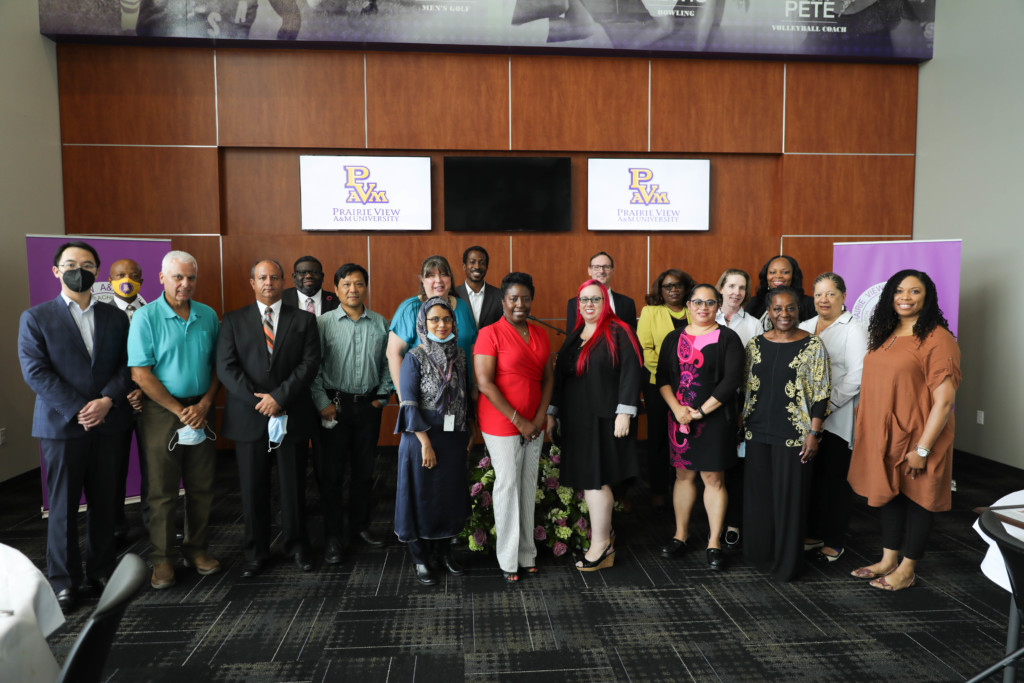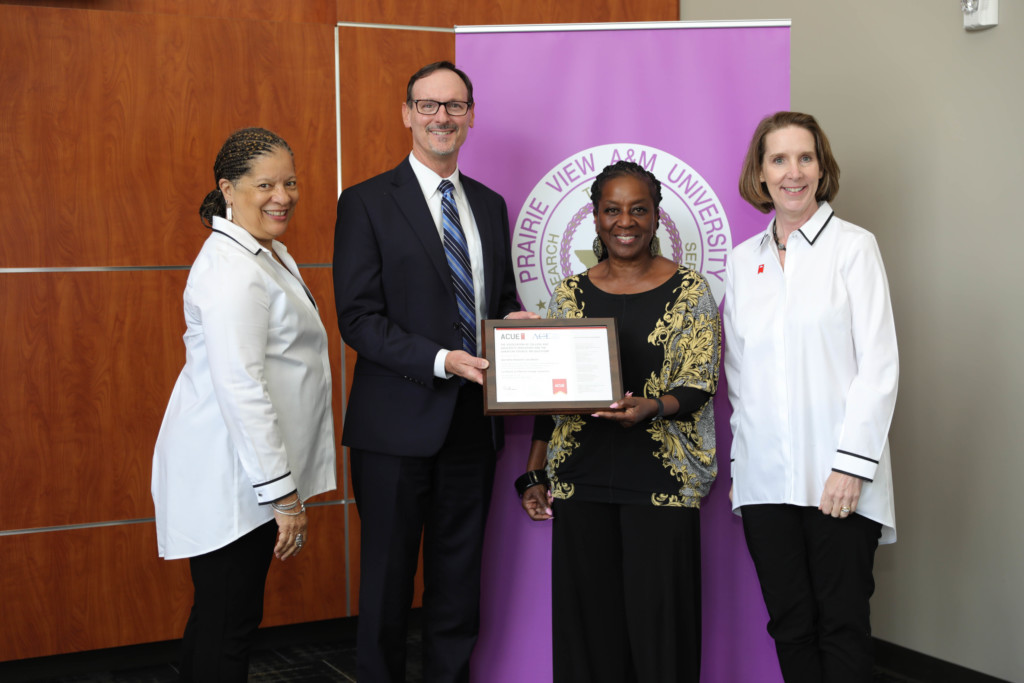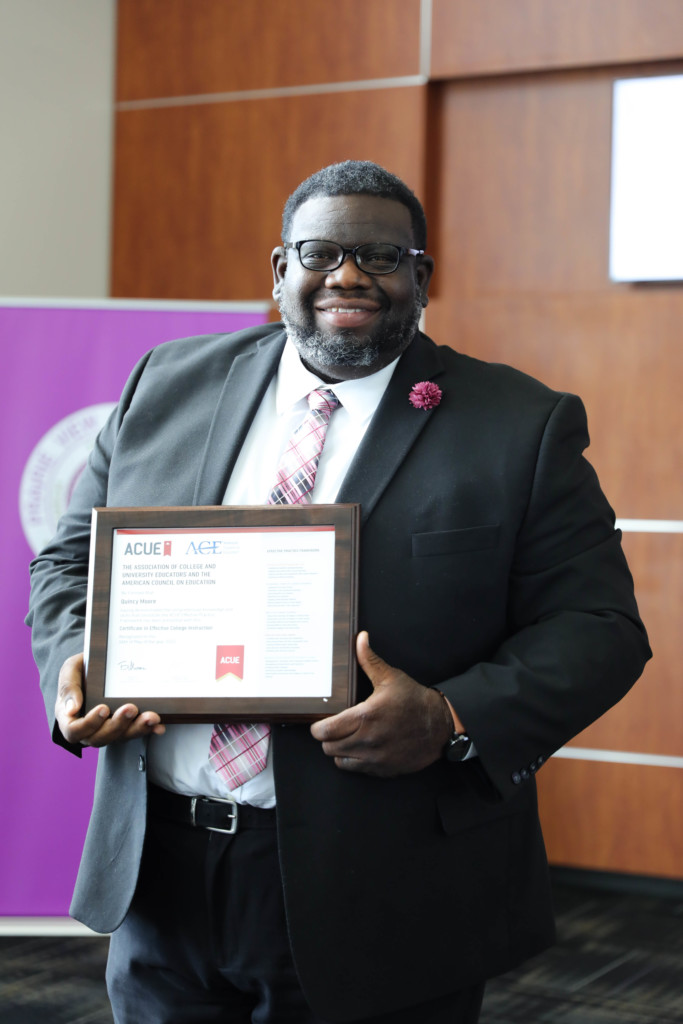PRAIRIE VIEW, Texas (October 21, 2021) – This fall semester, 51 members of the Prairie View A&M University faculty secured a Certificate in Effective Online College Instruction, a nationally recognized teaching credential co-endorsed by the Association of College and University Educators (ACUE) and the American Council on Education. A pinning ceremony held in the beautifully decorated Athletic Complex Panther Room on the PVAMU campus was the culmination of a nine-month effort, during which faculty members completed a 25-modules that required them to learn about and implement new evidence-based teaching practices in their classes and reflect on the experience.
Farrah Gafford Cambrice, a PVAMU associate professor of sociology, who served as one of the campus facilitators for the duration of the 2020-21 academic year (and has signed on to serve for a second year), said the timing of the course could hardly have been better.
“We had finished out the spring semester when ACUE started in September 2020, and it was the start of our first full year of doing online teaching,” Cambrice recalled. “The initial goal was to help transition faculty to the online format during COVID, and the course really helped faculty establish learning objectives and helped students become more engaged in an online setting. But beyond that, it gave us a chance to work with leading experts in the field around pedagogy and think about and implement best practices. It was an extraordinary opportunity.”
Aligned with the latest research in cognition and adult learning, ACUE’s course addressed more than 200 evidence-based teaching practices, covering how to design an effective course, establish a productive learning environment, use active learning techniques, promote higher-order thinking and utilize assessments to inform instruction and promote learning.
Harriette Howard-Lee Block, associate professor and biology department head, one of the 51 faculty members to earn the credential, said that the course was most helpful from an even more basic perspective.
“I found that it was probably the most beneficial tool that I could have had as it relates to learning what you really are expected to do as an instructor,” she said. “The course was really wonderful for someone like me who needed to get a little more comfortable in the online environment. Even though we were not face to face, I wanted my students to feel as comfortable as possible while I employed strategies to help them learn. We’re lifetime learners, and ACUE was good at the compassionate side of getting you to understand that you can do this, even though it’s something that’s new. That’s what learning is all about anyway.”
Cambrice said the program was by design.
“The course offered space to learn about strategies and encouraged participants to implement the strategies, but above all, it fostered a community around teaching and teaching practices,” Cambrice said. “My cohort met monthly for summary discussion. During the sessions, we put our highs and lows, our joy and pain, all on the table. Even though we were from different disciplines, we created a sense of camaraderie around this shared experience of trying to offer quality instruction for our students.”
Both Cambrice and Block noted the unusual circumstances surrounding the ACUE rollout – a shutdown caused by the COVID-19 pandemic, which led to faculty finishing out the type of academic year they had prepared for. “All of us, faculty, staff and students, had to quickly adjust to a situation that we were not use to,” Block said. “I think we had ten days to acclimate our minds to the online environment. The pandemic was an awakening. That’s what the future holds, and you have to be able to adapt to these situations. We have to transition to serve all students in whatever format we find ourselves in.”
Which is why the Certificate in Effective Online College Instruction is “geared toward online teaching, but can easily help instructors enhance their face-to-face teaching,” Cambrice said.
“We’re face to face this fall, but I believe I will be using these online strategies and tools again,” said Cambrice. “I think it would be naive to think that we won’t. I think that we learned that we have a lot of nontraditional students, particularly in graduate school, and that there are probably students better served by online education. This is not the last time that we’ll be doing this.”
By Andrew Cohen
-PVAMU-




